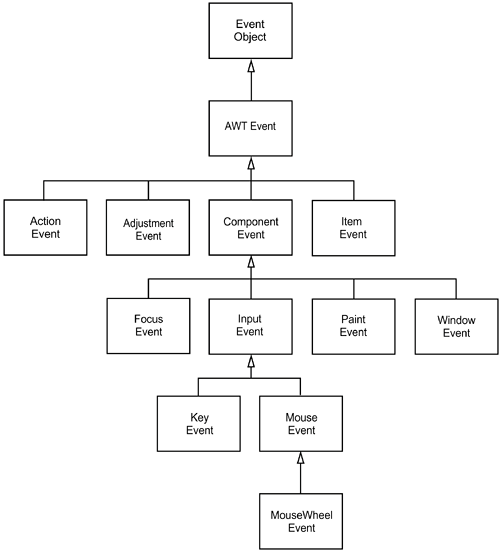The AWT Event Hierarchy
| Having given you a taste of how event handling works, we want to turn to a more general discussion of event handling in Java. As we briefly mentioned earlier, event handling in Java is object oriented, with all events descending from the EventObject class in the java.util package. (The common superclass is not called Event because that is the name of the event class in the old event model. Although the old model is now deprecated, its classes are still a part of the Java library.) The EventObject class has a subclass AWTEvent, which is the parent of all AWT event classes. Figure 8-5 shows the inheritance diagram of the AWT events. Figure 8-5. Inheritance diagram of AWT event classes Some of the Swing components generate event objects of yet more event types; these directly extend EventObject, not AWTEvent. The event objects encapsulate information about the event that the event source communicates to its listeners. When necessary, you can then analyze the event objects that were passed to the listener object, as we did in the button example with the getSource and getActionCommand methods. Some of the AWT event classes are of no practical use for the Java programmer. For example, the AWT inserts PaintEvent objects into the event queue, but these objects are not delivered to listeners. Java programmers don't listen to paint events; they override the paintComponent method to control repainting. The AWT also generates a number of events that are needed only by system programmers, to provide input systems for ideographic languages, automated testing robots, and so on. We do not discuss these specialized event types. Finally, we omit events that are associated with obsolete AWT components. Here is a list of the commonly used AWT event types. ActionEvent KeyEvent AdjustmentEvent MouseEvent FocusEvent MouseWheelEvent ItemEvent WindowEvent You will see examples of these event types in this chapter and the next. The javax.swing.event package contains additional events that are specific to Swing components. We cover some of them in the next chapter. The following interfaces listen to these events. ActionListener MouseMotionListener AdjustmentListener MouseWheelListener FocusListener WindowListener ItemListener WindowFocusListener KeyListener WindowStateListener MouseListener You have already seen the ActionListener and WindowListener interface. Although the javax.swing.event package contains many more listener interfaces that are specific to Swing user interface components, it still uses the basic AWT listener interfaces extensively for general event processing. Several of the AWT listener interfaces, namely, those that have more than one method, come with a companion adapter class that implements all the methods in the interface to do nothing. (The other interfaces have only a single method each, so there is no benefit in having adapter classes for these interfaces.) Here are the commonly used adapter classes: FocusAdapter MouseMotionAdapter KeyAdapter WindowAdapter MouseAdapter Obviously, there are a lot of classes and interfaces to keep track of it can all be a bit overwhelming. Fortunately, the principle is simple. A class that is interested in receiving events must implement a listener interface. It registers itself with the event source. It then gets the events that it asked for and processes them through the methods of the listener interface. C++ NOTE
|
EAN: 2147483647
Pages: 132